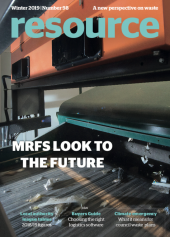A sideways view: As one door closes...
Ray Georgeson reflects on export markets, separate collections and recylate quality.
I know that I am not the only long-standing, loyal writer (or indeed reader) of Resource who believes in the essential need for separate collection of recycling to preserve quality and guarantee the sustainability of supply into markets that need high-quality material for high-quality manufacturing.

I know too that I am not alone in having carried this torch for many years; many great campaigners and policy implementers have been great champions for this sustainable, intelligent approach to managing recycling. Wales and Northern Ireland, of course, lead the way, with great work done by social enterprises that really understand the connection between the resident, the collector and the market, and generate great loyalty and participation. Bryson Recycling and Newport Wastesavers can take a bow.
Despite the best efforts of large parts of the traditional waste industry and local government to ignore the environmental, economic and social benefits of this form of recycling collection, it survives and will, of course, return to the mainstream of collection systems as the seismic market changes underway finally hit home.
When the Chinese door opened wide in the early 2000s and their economic strategy was fuelled by taking every tonne of poorly-sorted rubbish they could source for home reprocessing, UK politicians and policy makers breathed a sigh of relief as recycling rates started to climb on the back of this lucrative export market. The eye was taken off the ball of home market development and complacency reigned.
In recent years, the Chinese Government had repeatedly warned that it would be closing that export door and focusing on its own home collection and localised circular economy. That door remained ajar for a while, before it finally closed and now China has changed the locks.
But the wilier parts of our industry found a way to send their rubbish to the less guarded markets – Indonesia, Malaysia, India, Vietnam and more. The locksmiths and regulators are now busy there as well as those nations are realising that the promise of economic development through waste processing is not what it has cracked up to be. Localised pollution, plastic in the water courses ending up in the oceans and poor working conditions are certainly not what those modernising economies want for themselves, especially as they also rely on attracting foreign tourists to exotic, pristine environments.
 This article was taken from Issue 98
This article was taken from Issue 98As those export doors firmly close, there is a danger that our UK industry and local authorities get trapped. Too wedded to their ailing MRF sorting and co-mingling business model, unpicking the locks to find sustainable markets for high-quality recycling will be hard for them without radical change to their working methods.
The warning signs have been there for a long while, but they haven’t been heeded fast enough. Now more than ever, collecting key materials (like fibre) separately will be the way to secure a market at home, in the wider EU (still in there!) and even further afield if materials conform to enforceable regulatory standards.

A modern business model that embraces separation, quality, good communication, transparency of end destinations and ethics around working conditions in which materials are handled now has a great opportunity. I believe people increasingly desire this. In the past I have labelled it as ‘Fairwaste’ (in tribute to the fine work of Fairtrade) and I firmly believe it is an idea whose time has come.
As the door closes on the activity of the Resource Association, I hope that this agenda and the imperatives that drive it will be taken up by others, and not lost to a locked filing cabinet.
This door is ajar, there is sunlight awaiting behind that door – it’s time to bust it wide open, once and for all. 






